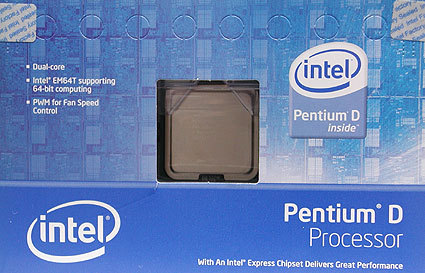A 4.1 GHz Dual Core at $130 - Can it be True?
How Is Breaking The 4 GHz Barrier Possible? Continued
To prevent resellers from scamming buyers by substituting counterfeit or modified parts, Intel packages the CPU so that its designator is visible through a clear plastic window. This enables buyers to verify that the specification number printed on the box agrees with the number on the part itself, without requiring them to open the package. This means you can check the authenticity of the CPU without even having to buy the processor first.
A clear plastic window lets buyers ascertain that the specification number on the box agrees with the number printed on the CPU.
Of course, those who buy their CPUs online can't perform such checks in advance of purchase, but that's where refund policies come into play: most buyers can return a CPU purchase within some days for a full refund without having to provide a reason. Here's an overview of all Pentium processors for Socket 775, with their code names and version numbers.
| CPU Overview | ||||
|---|---|---|---|---|
| CPU Name | Designation | Core | Version | Process |
| Pentium EE | 965 | Presler | C1 | 65 nm |
| Pentium EE | 955 | Presler | B1 | 65 nm |
| Pentium D | 900 Series | Presler | B1 | 65 nm |
| Pentium 4 | 6x1 Series | Cedar Mill | B1 | 65 nm |
| Pentium EE | 840 | Smithfield | A0 | 90 nm |
| Pentium D | 800 Series | Smithfield | B0 | 90 nm |
| Pentium D | 800 Series | Smithfield | A0 | 90 nm |
| Pentium EE | 3.72 GHz | Prescott 2M | N0 | 90 nm |
| Pentium 4 | 6x0 Series | Prescott 2M | N0 | 90 nm |
| Pentium 4 | 5x1 Series | Prescott | D0, E0 | 90 nm |
| Pentium 4 | 5x0J Series | Prescott | D0, E0 | 90 nm |
| Pentium 4 | 5x0 Series | Prescott | D0, E0 | 90 nm |
| Pentium EE | 3.46 GHz | Gallatin | M0 | 130 nm |
| Pentium EE | 3.40 GHz | Gallatin | M0 | 130 nm |
Get Tom's Hardware's best news and in-depth reviews, straight to your inbox.
Current page: How Is Breaking The 4 GHz Barrier Possible? Continued
Prev Page How Is Breaking The 4 GHz Barrier Possible? Continued Next Page Three Theories Where The Customer Comes Out AheadTom's Hardware is the leading destination for hardcore computer enthusiasts. We cover everything from processors to 3D printers, single-board computers, SSDs and high-end gaming rigs, empowering readers to make the most of the tech they love, keep up on the latest developments and buy the right gear. Our staff has more than 100 years of combined experience covering news, solving tech problems and reviewing components and systems.
-
Tnias I am quite interested in your post regarding the D 805. Considering that it is now available for around $60.00 (03/20/09), it still sounds like a steal. We just upgraded our Adobe CS2 software to the new CS4 Master Suite, which caused the need for a graphics card upgrade. We have an nVidia GeForce GTX 260, but haven't installed it because our computer is a HP Media Center PCm7350n computers each with a 2.8 GHz CPU on a ASUS P5LP-LE mobo. Your article seemed to imply that there is software available that might adjust the clock from inside windows and we are wondering if it can on that mobo or if we will have to get a different mobo. If so, we are wondering what might be our most cost effective but stable options. We are certainly going to need a new power supply for the GTX 260, which requires 525 Watts. We are looking at just putting in PC Power & Cooling’s, Silencer 610 EPS12V power supplyand letting it go at that, but we are also thinking about upgrading the CPU and mobo if necessary.Reply
Of course, we would like to keep the cost down as much as possible.
We have no idea where the best bang for the buck will be. For us a stable system is more important than blazing speed. Thus, the HP's worked fine for what we originally got them for; it’s just that our graphics and video production software are forcing upgrades in speed and power.
The D850 chip sounds incredible and the power supply we already have to get will handle overclocking that chip. It even sounds like that chip will work in the existing mobo if we can find a way to change the clock speed from inside windows instead of from the BIOS. HP BIOS does not allow adjusting the clock speed in the BIOS but can't BIOS just be changed as well; isn't it just an EPROM?
Anyway, even if we opt for changing out the mobo for another case compatible Asus mobo, we still have to answer the question of which board and chip combination will give us the most stable service for the least cost.
Any ideas that might help us plan the most appropriate upgrade and the least cost? -
amnotanoobie TniasAny ideas that might help us plan the most appropriate upgrade and the least cost?Reply
With the price of components that you need to make this run stable, and the amount of electricity that this would use, a cheap Core 2 and motherboard and DDR2 memory would cost you less in the long run.
Example:
Intel Pentium Dual Core E5200
Kingston DDR2 2x2GB 800MHz
Gigabyte G31M-ES2C
This should cost less than $200.

